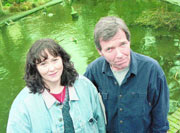WHY WOULD YOUNG men want to commit to six years of seminary, take a vow of celibacy, and accept a lonely parish charge? That’s the public relations challenge staring at Catholic seminaries in the wake of the current controversy over sexual abuse allegations against priests.
Nationwide, the number of seminarians has steadily declined since the 1960s, with enrollments sliding from 8,159 in 1967-68 to 3,584 currently. Meanwhile, the Catholic population keeps growing.
Catholic seminaries began psychological testing and background checks for applicants years ago, following a round of sexual abuse scandals in the 1980s.
But now seminaries have a new public relations disaster on their hands, so while they’ll be expected to screen more intensely, perhaps even trying to root out homosexuals (if some reactionary cardinals have their way), they’ll also be trying to fill the depleting ranks of parish priests. Seattle doesn’t have a Catholic seminary, but the School of Theology and Ministry at Seattle University trains graduate students for careers in both the Catholic Church and Protestant denominations. Sharon Callahan, the associate dean of academic programs and student affairs, spoke with Seattle Weekly about how recent headlines are affecting morale and policy at the school.
Seattle Weekly: What’s the mood of your students following this controversy? Do they want professors to talk about the church and its problems?
Dr. Sharon Callahan: I would say it’s not erupting into the classroom as a predominant concern at this point. People are concentrating on their studies, and the general format of classes doesn’t pull forth that kind of discussion. What we’ve done is schedule a series of events that will address the larger picture of the church outside of the classroom.
Will school staff need to be better prepared to respond to students’ questions about sexuality and the priesthood?
We have a full curriculum that helps people stay aware of this on a regular basis. That’s why I think it just isn’t bubbling up in the classroom—it’s a topic that is part of our normal conversations as students prepare for the ministry. Dr. Marie Fortune has taught courses in professional ethics in ministry for us [for the last six years]. It’s mostly about sexual misconduct. She’s taught all of our faculty, and we have taken some of her materials and incorporated them into our general ministry preparation. It’s hard to know what else might come out, but I don’t have a sense of panic in us.
Are students uneasy about being associated with the church?
I oversee all of the interviewing processes for admission. And it just has not come up in the interviews, so prospective students are not raising it as they’re trying to get into the program. It isn’t like people would keep that a secret from us—I’d know about it.
Does the School of Theology and Ministry use psychological testing to screen applicants?
We do background checks on every person we admit. And rather than psychological testing, we have them write a very detailed autobiography. We look for signs that might be indicators of areas that people would need to address. And I think we’ve been extremely careful, as careful as humans can be. It isn’t like people walk in with T-shirts saying, “I’m a pedophile.” It’s a guess-and-golly thing in some respects.
What do you look for?
There aren’t profiles that we’re taking. It isn’t that clinical, and it isn’t that definite. We simply don’t try to get into stereotyping. It’s sort of a cluster, and we’re trained to kind of read body language and listen to voice intonation. It’s just very intense.
Do you screen for sexual orientation?
Many Christian traditions, including some that are affiliated with us, have very stringent teachings against homosexuality, but we do not screen out gays and lesbians. I don’t think those issues are related [to sexual abuse], nor do I think celibacy is related to this issue.
Do you think that policy places you among the majority of seminaries nationally?
No, we’re not.
Are these latest revelations of child abuse undermining the reputation of the church in the eyes of students?
Our average age [of students] for the last 13 years has been 45. My sense of our students is that they’ve been seasoned. There’s a maturity that they bring, a certain wisdom. There’s a huge diversity of thought. Are they necessarily radicals wanting to take the churches on? On some issues, yes. But it’s not just the Catholic Church. I think every single hierarchy, no matter if it’s church, state, or corporation, participates in cover-up. Aren’t we going through exactly the same thing with the [Arthur] Andersen corporation and the cover-up around Enron?








